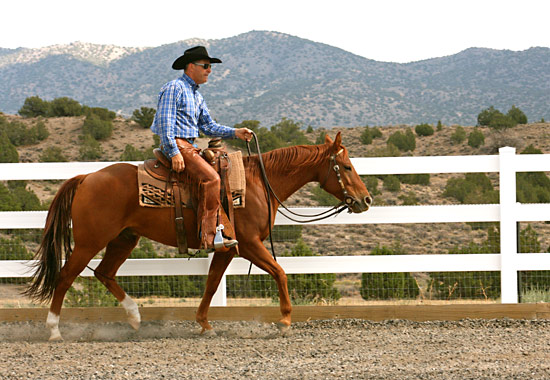 |
 |
|
Rein Communication
If I pick up on the bridle reins, I expect something to happen. My horse needs to yield, give and or slow down. Richard Winters
It’s very difficult to communicate with someone who does not speak clearly. If they mumble their words, and don’t finish sentences, it is
our tendency to begin to tune them out. How clearly do you speak to your horse? Are you presenting ideas in a way that your horse can
understand? Many riders lack clarity when communicating to their horse. Thus, their horse begins to fight and resist; or simply ignores the rider and tunes them out.
When riding our horse, much of the communication and control comes from our reins, down to the bit. How you handle your reins and
use your hands will determine how well our horse responds. When I watch riders, it is often difficult for me to determine what they are
trying to communicate with their reins. Are they taking out the slack and asking for a soft feel in the horse’s face? Do they want the
horse to decrease speed or stop? If I can’t tell what they are trying to accomplish, I’m guessing their horse isn’t quite sure either!
 |
With loose reins I’m allowing my horse to travel forward freely.
This is what I encourage riders to do. Either take hold of your horse’s face through the reins for a specific purpose, or let him go.
Anything less than that, or just having dead weight on the end of the reins, will begin to create a horse that is dull and who tunes us out.
If you want the horse’s nose to come down for collection then you need to take hold of the reins and wait for the horse to give to that
pressure. When the horse yields to that feel then it is important to release and let the horse be rewarded. This is how they learn. If you
hold and release arbitrarily then your horse begins to ignore the signal and becomes bracy.
I have taken hold of the reins and asked this horse to soften.
If I pick up on the bridle reins, I expect something to happen. My horse needs to yield, give and or slow down. When I pick up on the
reins, I’m committed to my horse making a change and yielding to my suggestion. When working with the green horse, I always reward
the slightest try. If they yield to my hands, I promise I will give the reins back to them. As a horse matures and develops in his training I
can ask for more feel and maintain that feel in a collected frame for longer periods of time. You might be a novice rider with limited
experience, yet when you watch me ride, I want you to be able to tell when I’m taking a hold of the reins and when I am letting go
(turning them loose.) If you can tell, then its very possible my horse can tell as well. Communicating through the reins simply and clearly is my goal.
Some riders are actually using their reins to keep their balance and to hold on. Needless to say, this is incorrect and horses will quickly
become resistant and frustrated with their rider. Each of us should strive to ride with an independent seat; meaning we don’t grip with
our legs to stay on and we don’t use our reins to help us keep our balance.
Riding with an independent seat without handling the reins.
In a safe enclosed environment, with a safe and gentle horse, you can practice developing an independent seat. Simply place your reins
down over the saddle horn for a few strides. Can you ride confidently and balanced without using the reins as a crutch? Try this at the
walk, trot and eventually the lope. You can always quickly retrieve your reins if things start to get out of control. To set your reins down for a few strides is liberating and can be fun.
You should also consider how much tension you have on the reins when you are stopped and at ease with your horse. Many riders
don’t completely release their reins after they have stopped. This causes many horses to begin to root their heads and pull on the reins.
They are asking for slack and are wondering why you are still holding on.
What I’m asking you to be aware of is not monumental and will probably only require slight adjustments and heightened awareness
while riding. However, these simple changes will enable you to speak more clearly to your horse and give you a more willing equine partner.
Richard Winters Horsemanship WintersRanch.com
|
 |
 |
 |
 |
 |
|
To advertise your horse product or service, Contact Ann
|
|
|
|
InfoHorse.com, Horse Information Lives Here ®
4/23/2024
Contact Us to Advertise to over a million Horse Owners.
All images and content Copyright© 2022 by InfoHorse.com,
|
|
|
|
Articles, Academic Schools, Arena Maintenance, Animal Communicators, Barns, Barn and Accessories, Barn Equipment and Tractors, Breast Collars, Grooming Products for Horses, Hay Feeders, Horse Blankets, Horse Breeders, Horse Camping Gear, Career Schools, Horse Training Clinicians, Equestrian Clothing, Dogs and Puppies, Horse Fencing, Horse Products For Sale, Fly Control, Foal Care, Horse Footings, Horse Gifts, Horse Health and Nutrition, Hoof and Leg, Horse Insurance, Certified Trainers, Equine Lawyers, Leather Care, Links , Portable Horse Stalls, Arenas and Roundpens, Horse Riding Schools, Horse Schools, Safety Products, Services for Horses, Horse Trailers, Horse Shipping, Horse
Skin Coat Care, Specialty Trainers, Horse Summer Camps, Tack, Horse Trainers, Treats and Snacks, Truck Accessories, Trucks, Horse Vacations, Western Lifestyle
|
|